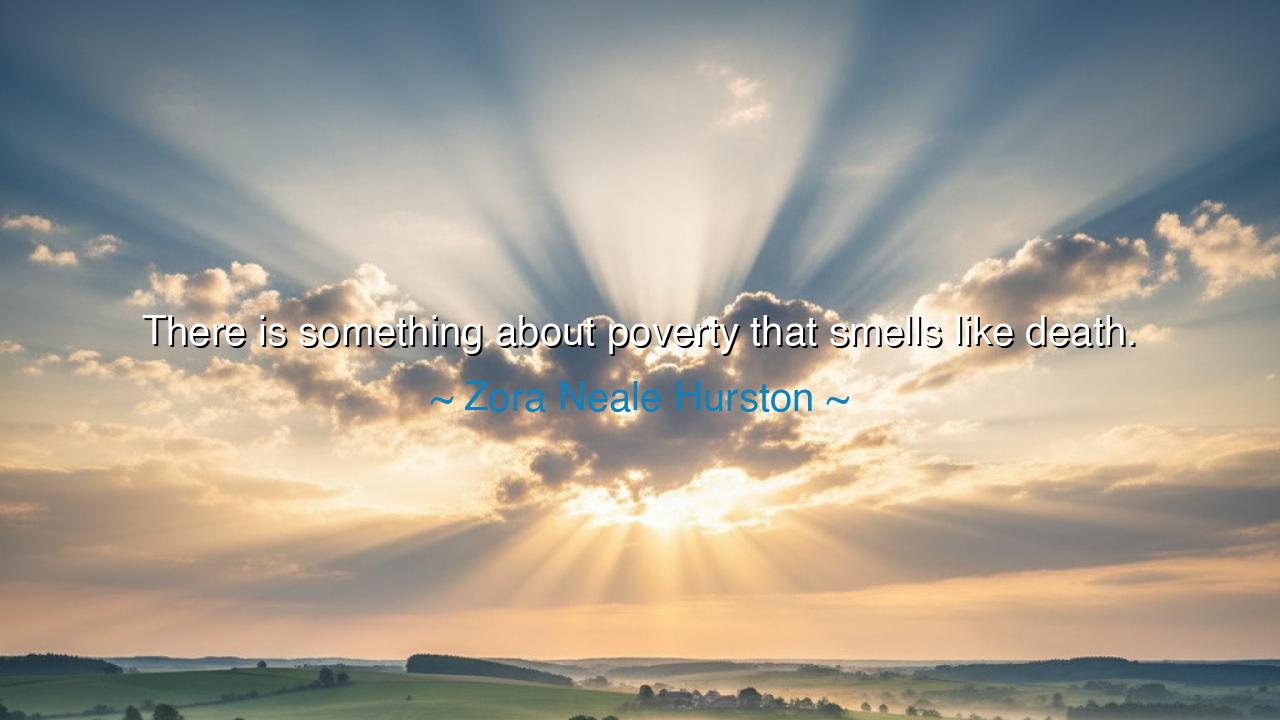
There is something about poverty that smells like death.






The words of Zora Neale Hurston, “There is something about poverty that smells like death,” rise like a dark wind from the soul of experience — a cry, not only of sorrow, but of recognition. In this haunting phrase, Hurston gives voice to what many have felt but few have dared to name: that poverty, in its deepest form, is not merely the lack of money or comfort, but the slow withering of the human spirit. To live in poverty is to stand at the edge of life’s feast and be told that one does not belong; it is to breathe in despair until it clings to the body like the scent of decay. She does not speak of death as a poetic fancy, but as an ever-present shadow — the quiet, suffocating death of dignity, hope, and possibility.
Born in the early years of the 20th century, Zora Neale Hurston knew this truth not from distance but from life itself. As a Black woman in the American South, she witnessed the grinding weight of poverty upon her people — a burden that chained the mind as much as the body. Her words emerge from that crucible of hardship, from the long nights when hunger and humiliation crept into the homes of the poor. She knew that poverty kills not only by starvation, but by silencing dreams. The “smell of death” she describes is the odor of forgotten souls — of potential buried too soon, of songs unsung because survival demanded silence.
The ancients understood this same truth. In the great city of Athens, Socrates spoke often of the corruption of the soul that comes from deprivation — not merely of wealth, but of education, of opportunity, of respect. In the Roman world, Seneca warned that “poverty is the image of death,” for it strips away power, choice, and pride. To live always in need is to live half-alive, caught between existence and erasure. Hurston’s words, though born centuries later, echo these timeless laments: the poor man walks among the living, yet the world does not see him. In this invisibility lies the true stench of death — the decay of being unseen.
But Hurston’s sentence is not only an elegy; it is also a summons. It calls us to awaken from comfort and confront the rot that poverty breeds in the heart of civilization. For poverty, like death, is contagious — it spreads where compassion fails. When a society grows blind to the suffering of its weakest, it begins to die from within. Its soul becomes hollow, its cities haunted by the ghosts of the neglected. Hurston’s truth is therefore both personal and prophetic: to let poverty persist without mercy is to invite the death of humanity itself.
Consider, for instance, the tragedy of the Great Depression — a time when millions, once proud and free, were stripped of livelihood and cast into despair. Photographs from that era, taken by artists like Dorothea Lange, captured not just hunger but the erosion of spirit. Faces once lit by hope became hollowed by endurance. Children’s eyes carried the weight of resignation far beyond their years. And yet, in the midst of that ruin, communities that reached out to one another — that shared bread, that sang together, that built from nothing — defied the odor of death. They proved that poverty’s true enemy is solidarity, that the human heart, when awakened by compassion, can resurrect even from dust.
Thus, Hurston’s words carry not despair alone, but a challenge to all who hear them: do not let poverty be the final word. See it, name it, and fight it — for every act of indifference feeds the grave she describes, and every act of generosity breathes life back into the world. When we feed the hungry, uplift the weary, or educate the forgotten, we strike at death itself. We declare, through deed and spirit, that humanity shall not be defined by what it lacks, but by what it gives.
So remember this, my child of the future: poverty smells like death because it is the slow fading of the divine spark in man — but that spark can be rekindled. Let your heart not grow numb to the suffering around you. Seek out the unseen, uplift the fallen, and restore the forgotten to the realm of the living. For every soul rescued from despair is a resurrection, every act of kindness a defiance of death’s dominion. And when we stand together against poverty, we do not merely preserve life — we restore to it its sacred fragrance of dignity, hope, and human worth.






AAdministratorAdministrator
Welcome, honored guests. Please leave a comment, we will respond soon